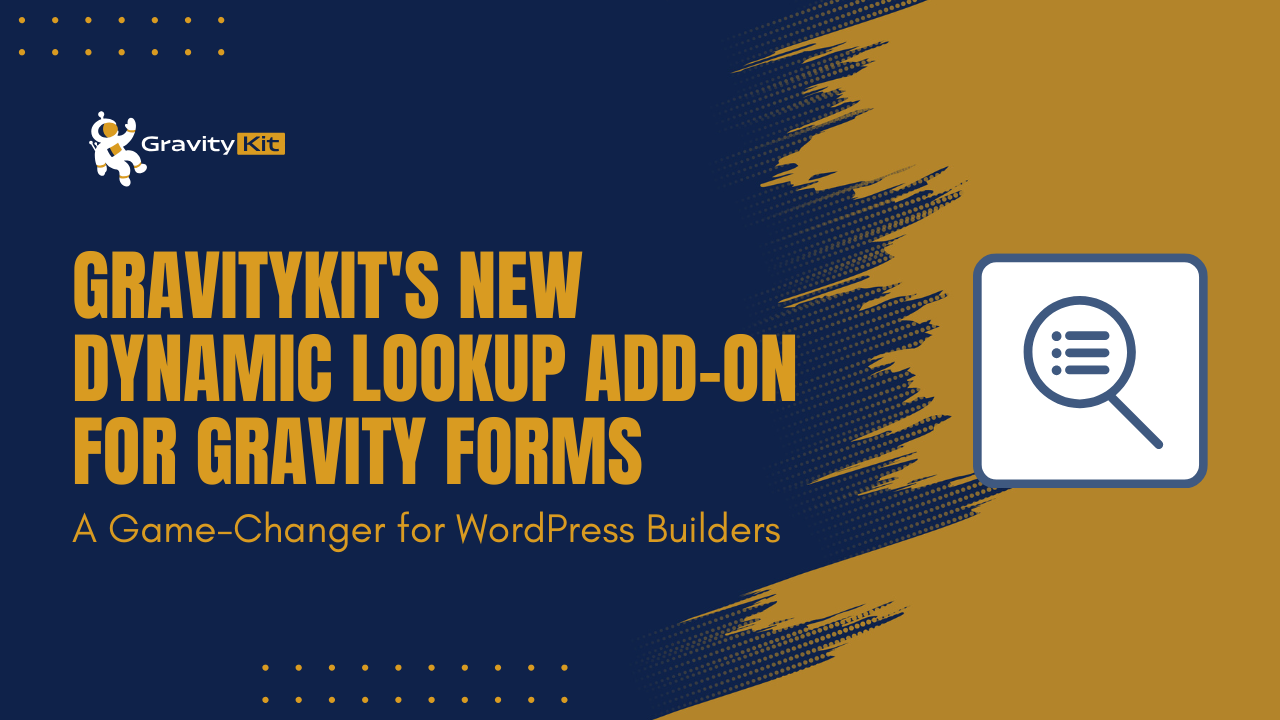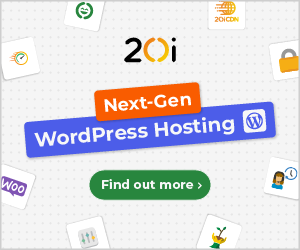Heads up: This is a sponsored article, which means it’s paid content from one of our partners—not a news piece. We only work with sponsors who bring value to the WordPress community, and their support helps keep The Repository running.
Gravity Forms is more than just a form plugin—it’s a foundation for building powerful, data-driven applications. But to truly harness its potential, you need the right tools. That’s where GravityKit comes in.
As the leading application builder for Gravity Forms, GravityKit enables users to create interactive directories, dashboards, reporting systems, and more—without the need for code, CPTs or ACF. By leveraging front-end displays, and advanced data management tools, GravityKit extends Gravity Forms far beyond simple form submissions.
Now, with the launch of Gravity Forms Dynamic Lookup, GravityKit is making it even easier to connect data across forms and create dynamic, no-code solutions. This new, free add-on introduces a Lookup field type, allowing users to populate field choices from other sources, leading to improved efficiency and consistency.
Let’s explore how GravityKit is redefining what’s possible with Gravity Forms—and why it’s the go-to toolkit for many professionals building web applications on WordPress.
What is GravityKit?
GravityKit is a Certified Gravity Forms Developer, officially endorsed by Gravity Forms for our expertise in building powerful, reliable add-ons.
GravityKit offers an innovative, well-integrated set of tools for Gravity Forms users. Our primary niche is application building. We provide add-ons that leverage the data management capabilities of Gravity Forms and enable you to create fully fledged web applications that serve diverse needs.
Introducing GravityKit’s newest free add-on… Gravity Forms Dynamic Lookup!
Gravity Forms Dynamic Lookup adds a new “Lookup” field type that enables you to populate field choices with data from other form entries or WordPress users.
Instead of manually entering information, users can select from existing records, ensuring data consistency, reducing duplication, and improving efficiency.
A lookup field pulls data from another source, helping to create relational data structures. When we learned that “lookup” fields are commonplace across a range of popular applications, especially in the CRM space (e.g., HubSpot, Airtable, Salesforce), we thought to ourselves, “Hey, shouldn’t Gravity Forms users be able to do this, too?”.
Moreover, this new Lookup field represents an important addition to Gravity Forms by adding the ability to leverage relational data structures in front-end applications… But more on that later!
If you’re a Gravity Forms user and you want to learn more about Dynamic Lookup fields, check out the video below for an in-depth walkthrough.
Building free add-ons for the Gravity Forms community
While our primary focus is on premium tools for Gravity Forms, we take pride in offering a range of free add-ons as well. With well over 100,000 downloads combined, our free plugins deliver real value to the Gravity Forms community.
- Gravity Forms Widget for Elementor – Adds a much needed Gravity Forms widget to Elementor for easy form embedding and configuration.
- Gravity Forms Entry Tags – Adds an “Entry Tags” field type for grouping entries with color-coded, user-defined labels.
- Gravity Forms Event Field – Adds a comprehensive “Event” field type with optional sub fields.
- Gravity Forms Zero Spam – Blocks forms spam and sends spam summary email reports.
- GravityExport Lite – Enables you to export Gravity Forms entry data to Excel using a secure, shareable link.
- And now, Dynamic Lookup – Adds a new field type, enabling you to Dynamically populate field choices with Gravity Forms entries or WordPress users.
GravityKit: The “application builder” for Gravity Forms
WordPress users have always struggled with creating custom web apps. You either need to find a plugin that already does exactly what you need (unlikely!), or you have to build something yourself using code or complicated plugins like ACF.
GravityKit is the ultimate toolkit for Gravity Forms users. Our flagship plugin, GravityView, takes the power and versatility of Gravity Forms and adds a customizable front end interface on top. This gives you a complete solution for building versatile web apps and information systems on WordPress, without any code.
GravityView offers a simpler solution for creating web apps on WordPress—a form-based approach for easy CRUD creation. Gravity Forms handles the “Create” operation, while GravityView handles the “Read”, “Update” and “Delete” side of things.
We then offer additional add-ons that can either be used standalone, or together with GravityView to bolt on more functionality. For example, our “Kit” includes solutions for charting, reporting, calendars, calculations, and more.
“It’s a different way of doing things. With our tools, you can leverage the data management capabilities offered by Gravity Forms and bypass the need for custom post types entirely by working directly with your form entry data.” – Zack Katz, founder of GravityKit
While ACF has always been the go-to choice for developers, it’s not necessarily the easiest to use, as Remkus de Vries notes in the Tweet below.
GravityKit provides flexibility, catering to both developers and non-technical users. With a drag-and-drop builder and preset templates, it’s easy to get started, yet fully customizable for those who want to extend functionality with a low-code approach.
For example, when Leadpal found themselves needing to create a custom affiliate dashboard, they decided against building it themselves and turned to a no-code solution using WordPress, Gravity Forms, and GravityKit. This approach enabled them to create “Tracker,” a brand new product, without the need for custom development.
“GravityKit has been instrumental in allowing us to develop the Tracker product without any additional development time—something we’re often short on. In fact, Tracker wouldn’t exist without GravityKit, as it enabled us to build a fully functional product quickly and efficiently!” – Paul Grayson, co-founder of Leadpal
Web agency owner, Eric Nutter, relies on GravityKit as his go-to toolkit for creating innovative WordPress solutions. From an AI-powered content generation platform to a custom CRM system, Eric leverages GravityKit to meet diverse client needs, quickly and effectively.
“GravityKit is absolutely an essential plugin for our business. It gives us the ability to quickly and easily deliver effective and efficient web tools to our clients to meet their unique needs.” – Eric Nutter, owner of Slight Revision
Why Dynamic Lookup is a game-changer for GravityKit
The new Dynamic Lookup add-on supports relational data structures, making it easy to link entries across different forms (think: linking a customer to their orders or an employee to the company where they work).
With GravityView, these relational data structures also exist on the front-end, enhancing the way information is organized and displayed. This makes it possible to build even more advanced information systems and web applications.
Premade applications and live demos
We maintain a live demo site, powered by InstaWP, where readers can explore real-world examples of GravityKit in action. From user directories and project management systems to interactive dashboards, our showcase offers inspiration for developers, site owners and agencies alike.
You can clone the site to play around with the examples and test features instantly without installing anything. This makes it easy to evaluate solutions for your own projects.
The evolution of the Gravity Forms ecosystem
Well-known to most WordPress users, Gravity Forms has been a frontrunner in the WordPress form space since the early days. Over time, its ecosystem has expanded, encompassing a wide range of powerful add-ons and integrations. And it continues to grow and evolve, unlocking even more possibilities for users and developers alike.
At GravityKit, we have customers that have shifted their entire “stack” over to Gravity Forms, citing the flexibility and power the ecosystem provides.
“The flexibility of the Gravity Forms ecosystem empowers developers and agencies to build tailored solutions that go far beyond simple forms. With tools like GravityView and our suite of add-ons, you can transform Gravity Forms into a dynamic platform for managing, displaying, and interacting with data in ways that fit any project’s needs.” – Zack Katz, founder of GravityKit
GravityKit: A new way to build web apps on WordPress
Gravity Forms Dynamic Lookup is just one piece of the larger GravityKit add-on suite, which continues to redefine how users build applications on WordPress. With relational data structures and front-end display options, GravityKit empowers developers and agencies to create powerful web applications—all without touching a line of code.
As the Gravity Forms ecosystem evolves, so do the possibilities. Whether you’re building an internal business tool, a membership directory, or a client dashboard, GravityKit’s suite of add-ons is designed to scale with your needs.








